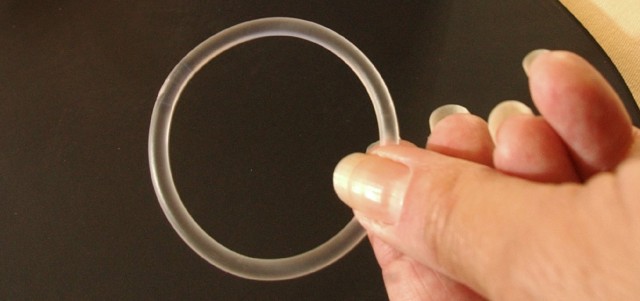
Merck, the drug company that makes the NuvaRing birth control product, announced last week it will pay $100 million to settle thousands of claims from women who believe they were harmed by using the product.
As NPR reported Monday, NuvaRing is the most recent hormone-based kind of birth control to "become the focus of scrutiny." All hormone-based contraceptives, including the pill, put a woman at increased risk of blood clots, stroke and heart attack. Women need to weigh the risks of pregnancy with the risks of hormonal contraception, experts advise. But the key thing to remember is that the risks remain rare.
Dr. Michael Policar is an associate professor of obstetrics and gynecology at U.C. San Francisco. "If you take a rare event, make it a little more common, it is still a rare event," he told NPR -- but still believes that studies are needed that compare NuvaRing head-to-head with other forms of contraception.
NPR does a great service explaining absolute vs. relative risk. From their analysis:
The nonprofit sex education website Besider.org lays out absolute risks of blood clots: For young women who are not pregnant and not using a birth control method with estrogen, the risk of forming a blood clot is about 1 in 5,000 per year; when using birth control methods with estrogen, that risk may be as high as 1 in 1,000 per year.
Women need to compare that to the risk of pregnancy, too, says Bill Albert, chief program officer for the National Campaign to Prevent Teen and Unplanned Pregnancy, which runs Bedsider. The risk of forming a blood clot while pregnant shoots up to about 1 in 340, Albert says.
Given the various complications of an unplanned pregnancy, Albert says, "skipping birth control altogether for fear of blood clots isn't the way to protect oneself."
Some advocates have been pushing for more disclosure of NuvaRing's risks -- but believe the product does not have to be pulled from the market. "Even when there's scientific uncertainty … that information can be presented in a way that women can deal with," Amy Allina, with the National Women's Health Network, told NPR. She continued:
Merck's proposed settlement is "generally a good development if it means that women are able to get the resources they need," Allina says. But clearer explanations of risk are needed for women who may be looking at NuvaRing in the future.
A spokeswoman for Merck says the company "does conduct routine and ongoing monitoring" of the product and that "we also update the labeling for our products on a regular basis and where appropriate to reflect reported adverse events, regardless of whether causality has been established."
Women have lots of choices when it comes to birth control, Policar says. A range of methods — some without any hormones — are available. Second, blood clots "happen almost entirely in women who are predisposed" because of their weight, age, family and personal history, or smoking habit.
Finally, if a woman is happy with the method she has and is using it effectively — and is in the low-risk category — she should know the risk of blood clots with the NuvaRing is still less than with pregnancy.
Then, Policar says, he would "leave the choice up to her."
[contextly_auto_sidebar id="CdiAKIyQ0fITXe5b3wjOCvkdq8GTzKT8"]